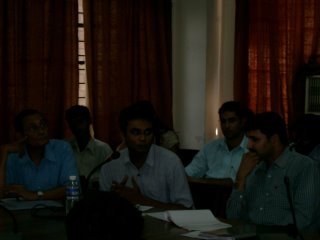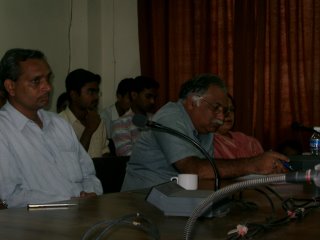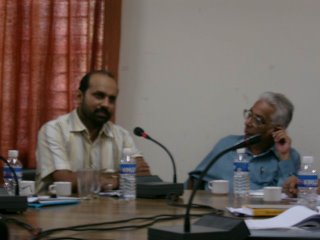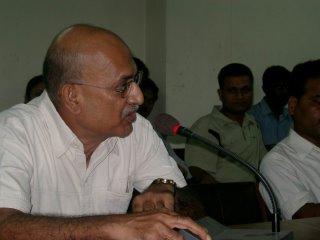DISCUSSION ON BALOCHISTAN
13 September 2006, Wednesday
Committee Room, SIS, JNU
The discussion focused on the developments in Balochistan after the killing of Akbar Khan Bugti, the leader of Bugti tribe. Linkages to past insurgencies in the region, demands of the Baloch Sardars, interests of Baloch sub tribes, involvement of a foreign hand and the role of the Pakistani army in Bugti's killing were some of the significant factors examined. Another crucial issue debated was whether Bugti's death has any space for external intervention in Balochistan.
Dr. Suba Chandran
Assistant Director,

Bugti's killing has not yet become a political disaster. It was a military initiative with no involvement of the political elite. Musharraf has won the 'battle' but the 'war' against Baloch nationalism is far from over. Also, without external support, Baloch nationalist movement will not succeed.
Moreover, there were series of surrenders by Marri and Bugti tribesmen and Musharraf ensured that no political vacuum prevailed before the killing of Bugti. Two days before the killing, a tribal jirga comprising of most of the sub tribes was held that decided to confiscate Bugti's property. The jirga agreed on the prevalence of Pakistani Law and abolition of the Sardari system.
Sui is highly important to
Secondly, the future of the Baloch nationalist movement is unclear. Nawab Akbar Khan Bugti, Sardar Ataullah Mengal, and Nawab Khair Bux Marri had their own differences that resulted in numerous egoistic clashes. With the killing of Bugti, the question is who will represent him? There is an intra family clash among the Bugtis over the new Sardar's position. The alliance of the heads of three tribes against the centre is in trouble. However, another view is that by killing Bugti, Musharraf has made him a national 'hero.'
Thirdly, the Balochistan Liberation Army or BLA does not have the capability to fight a long waged war against the army or carry out guerilla warfare. It remains a Marri militia and the involvement of Bugtis and Mengals is limited. The role of the middle class and the Baloch Diaspora in the BLA has to be analyzed in greater depth. It is doubtful if the BLA will become a potent force to reckon with, given its inherent weakness and strength of
So far, it is a military initiative and not a 'national disaster' and the opposition has not been able to mobilize or push for the no-confidence motion. Even the PML-Q has not split. The MMA will decide whether it wants to continue its membership in the Baloch Legislative Assembly. Thus, Bugti's killing has not become a rallying point for the political parties. Only some border districts of Sindh and
Many believe that US has vested interests in the region because of the Chinese presence and interest in Gwadar. It is important to bear in mind that neither the Baloch nationalist movement nor the Baloch armed movement will succeed until they get proactive external support.
Cdr.Alok Bansal
Research Fellow,
Sporadic cases of violence continue across the entire length and breadth of Balochistan. The Gwadar port, Mirani dam, and government buildings have been targeted besides communication links and gas pipelines that have been hit by the insurgents with alarming regularity. Security forces have raided some Baloch living in
It would be misleading to consider the incidents at Dera Bugti and Sui as distinct from other events in Balochistan. The fighting against the security forces around Sui and Dera Bugti has been largely carried out by Bugti tribesmen, as is borne out by the control that was exercised by Nawab Bugti on the tribesmen. But the BLA’s involvement has also been clearly evident. In fact, an organization called Baloch Liberation Front (BLF) claimed responsibility for the firings on the Sui gas plant. Nawab Bugti has claimed that BLA, BLF and BPLF are different organisations, but they appear to be one and the same organisation or at best three closely allied organisations. Their men are suspected to be manning the positions on the hills surrounding the region. It is likely that the firing of Russian made rockets and mortars has been coordinated by these three groups. Nawab
Bugti as well as Nawab Khair Bux Marri and Sardar Ataullah Mengal have not hidden their sympathies and support for the BLA. Their articulations of Baloch demands and negotiations indicate that they have influence with the BLA, but they may not control this organisation. “This is why anti-Islamabad Baloch leaders are not prepared to take responsibility for the actions of BLA even as they secretly urge it to wage war against the external ‘occupying’ power.”
If the violence in Balochistan intensifies, the Pakistani army will definitely be sucked into a war that will fester and bleed
According to columnist Fakir S Ayazuddin, “There is the possibility that a situation could develop whereby all these fronts could open up and we would be on hunt and attack missions in all these areas. To see
The political developments in Balochistan indicate that




0 Comments:
Post a Comment
<< Home